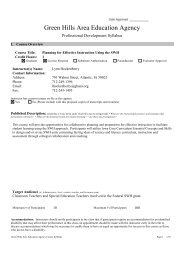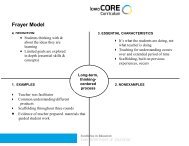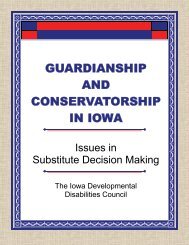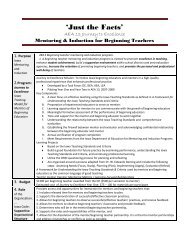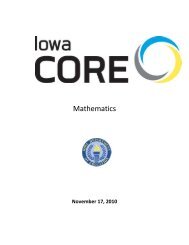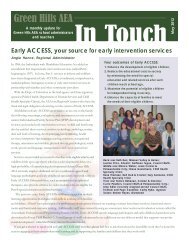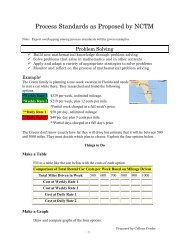The Arc's Self-Determination Scale: Procedural Guidelines
The Arc's Self-Determination Scale: Procedural Guidelines
The Arc's Self-Determination Scale: Procedural Guidelines
Create successful ePaper yourself
Turn your PDF publications into a flip-book with our unique Google optimized e-Paper software.
proposing the existence of drives, traits, impulses or needs have<br />
not overcome the criticism that they fail to account for the marked<br />
variability in human behavior across time and environmental<br />
conditions. It is not the presence of motivated behavior that is<br />
questioned, but whether it is useful to ascribe such behaviors to<br />
drives, traits, needs or impulses. It is almost impossible to<br />
describe self-determination as a characteristic of a person without<br />
entering this morass.<br />
<strong>Self</strong>-<strong>Determination</strong> Defined<br />
To circumvent the problems associated with defining selfdetermination<br />
as either a set of behaviors or as a characteristic of<br />
an individual, we have defined this construct according to<br />
characteristics of actions or events. <strong>Self</strong>-determination refers to<br />
"acting as the primary causal agent in one's life and making<br />
choices and decisions regarding one's quality of life free from<br />
undue external influence or interference" (Wehmeyer, 1992a; in<br />
press b). An act or event is self-determined if the individual’s<br />
action(s) reflected four essential characteristics: (1) the individual<br />
acted autonomously; (2) the behaviors were self-regulated; (3) the<br />
person initiated and responded to event(s) in a “psychologically<br />
empowered” manner; and (4) the person acted in a self-realizing<br />
manner (Wehmeyer, in press; Wehmeyer, Kelchner & Richards,<br />
1994). As the description “essential” suggests, we propose that<br />
self-determined behavior reflects all four of these characteristics.<br />
<strong>The</strong>y represent a set of attitudes (psychological empowerment and<br />
self-realization) and abilities (behavioral autonomy and selfregulation)<br />
that must be present if a person is to be selfdetermined.<br />
To the degree that a person consistently (not to be<br />
confused with unfailingly) exhibits self-determined actions, he or<br />
she can be construed as being self-determined.<br />
Deci and Ryan (1985) emphasized the importance of the belief<br />
that one causes things to happen in one’s life for intrinsic<br />
motivation. Causal agency implies that an outcome was<br />
purposeful and the action performed to achieve that end. A causal<br />
agent is someone who makes or causes things to happen in his or<br />
her life (Wehmeyer, Kelchner & Richards 1994). <strong>The</strong> emphasis on<br />
causing things to happen in (rather than controlling) one’s life is an<br />
important distinction because there are times when even the most<br />
self-determined person chooses to relinquish actual control over<br />
actions. Wehmeyer and Berkobien (1991) pointed out that if a<br />
person is having his or her gall bladder removed, he or she may<br />
want to have control over the decision to undergo this procedure<br />
and choose the surgeon to perform the procedure, but if that person<br />
22




